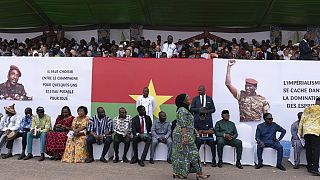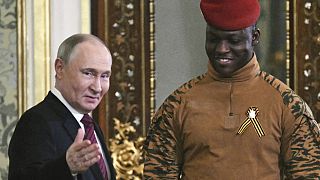Burkina Faso
The body of Burkina Faso's revolutionary leader Thomas Sankara was buried Thursday alongside 12 of his comrades at the spot where they were assassinated in a coup three decades ago.
The ceremony was held in the presence of Prime Minister of Burkina Faso Apollinaire Joachim Kyélem de Tambèla.
Sankara came to power in August 1983 as an army captain, aged 33.
Nicknamed Africa's Che Guevara, he was a fiery Marxist-Leninist who blasted the West for neo-colonialism and hypocrisy.
He changed the country's name from the colonial-era Upper Volta to Burkina Faso - "the land of honest men" - and pushed through a range of reforms, including promoting vaccination and banning female genital mutilation.
Sankara was idolised by supporters of pan-Africanism and egalitarianism, but his tenure was short-lived.
He and a dozen other leaders were gunned down by a hit squad at a meeting of the ruling National Revolutionary Council in the capital Ouagadougou.
The killings took place on the same day that Sankara's comrade-in-arms, Blaise Compaore, seized power.
He went on to rule for 27 years, during which Sankara's death was a strict taboo. In 2014 he was ousted by public protests.
After Compaore's downfall, the 13 bodies were exhumed from a cemetery on the outskirts of the city for an investigation.
It led to a lengthy trial that culminated in April 2022 with life terms in absentia for Compaore and the suspected hit squad leader, and a similar term for a detained general who had been army commander at the time.
In light of this trial, the 13 should be buried "honourably," the government said previously.













00:51
Liberia's former president William Tolbert symbolically reburied, 45 years after his murder
01:19
Judges grill former Haitian PM over 2021 assassination of president
01:15
Haiti restarts investigation into murder of president Jovenel Moise
Go to video
Congolese anti-corruption Martyr inspires a new generation
Go to video
François Compaoré unable to leave Ivory Coast for France after visa expires
01:11
Ten years since Compaoré’s overthrow: Burkina Faso’s decade of turmoil